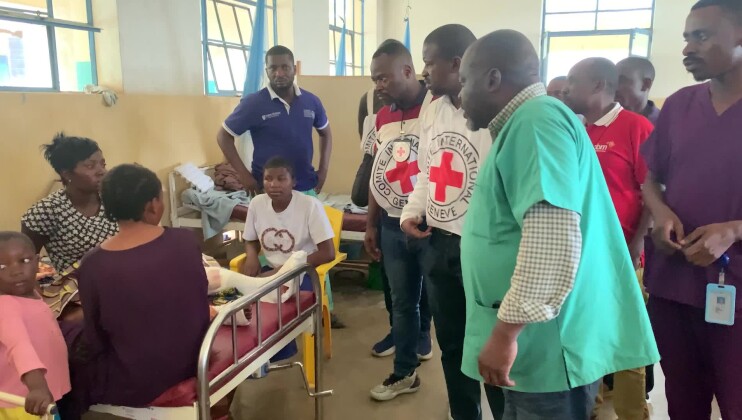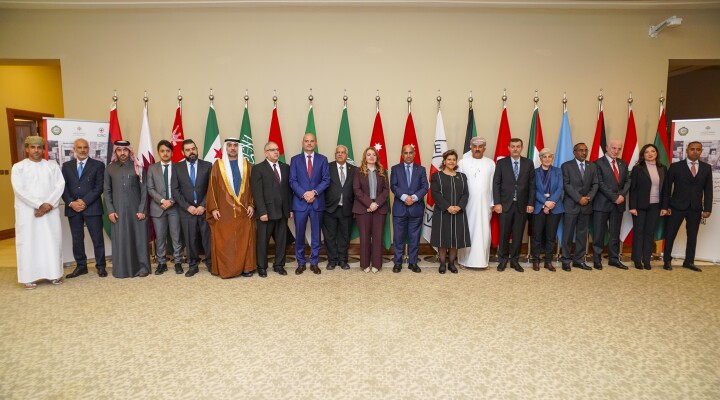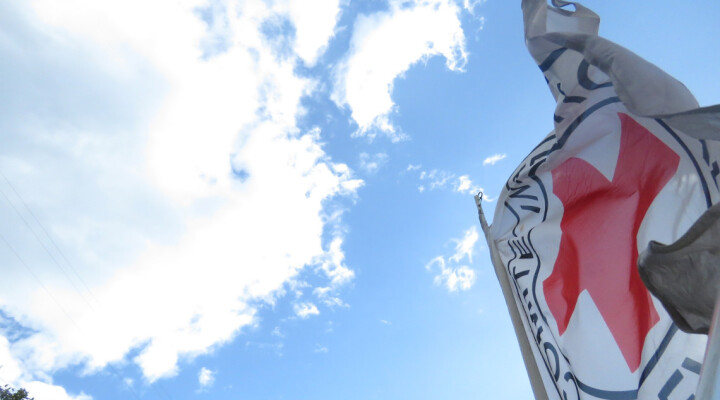Iraq: Expanding deserts, searing temperatures, and dying land: Climate crises deepen struggle of farmers
Iraq has been burdened with wars, sanctions, and domestic conflict for over 40 years, but the potential economic and environmental fallout of the climate crisis is by far one of the most serious long-term threats facing the country today. Iraq, the country of the two rivers, the Tigris and the Euphrates, is one of the five most vulnerable countries in the world to climate change.
Desertification affects 39% of Iraq’s territory. Very high temperatures are becoming more common, drought more frequent, and dust storms more intense. Rainfall has reduced in recent years and rivers dried up, which led to thousands of dunams (equivalent to about 2,500 square metres) to turn dry and yellow.
“We have been living here for generations. These areas were marshes full of water and the lands were fertile. We used to farm all year. Today it’s a total desert,” said Riyadh Al Ghazali one of the tribal leaders in Al Qadasiya district.
Communities residing in areas once known for growing rice and wheat are now struggling to survive. Al-Miskhab in Najaf governorate has always been famous for growing amber rice, a special type known for its distinctive aroma. “Amber rice is considered one of the finest types of rice in the world. Nothing can compare to it; it has a unique taste and smell,” said Iyad Muhsen one of the famers in Al-Mishkhab.
Food production in Iraq is based on smallholder agriculture, which traditionally has met the needs of its population. However over past years the sustainability of the agricultural sector has been undermined by many factors, including conflict, climate change, and water scarcity.
Iraq is an agricultural country practicing mainly rain-fed agriculture, severe drought, desertification, and the lack of alternative water resources has led to a drastic reduction in the planting of amber rice. Authorities and residents predict this famous Iraqi rice will no longer exist if these conditions continue.
“The land dedicated to growing rice in Najaf decreased from over 230,000 dunams to 5,000-6,000 dunams and most of what’s grown today is not even amber rice as it needs a lot of water,” said Muhanad Saree, a rice-mill owner.
Farmers are fatigued and feeling hopeless. They are slowly and painfully losing their source of income, their cattle are dying, and they are forces to leave their lands and migrate to urban areas in search of alternative source of income. “Our source of income comes from farming and livestock and both are gone. That's why our children left and the area is full of abandoned houses,” said Bassem Karim.
Farmers in Iraq made it clear that environmental and climate factors are making their lives harder. “It’s painful for us to see how dry our lands have become. We are even psychologically affected, frustrated, and don’t know what to do,” said Bassem Karim, a farmer who has a master’s in economics and refuses to leave his land.
The, ICRC along with our partners the Iraq Red Crescent Society, works to alleviate water stress by rehabilitating water pumping and treatment stations, piped networks, and irrigation systems. We are also supporting hundreds of farmers with cash assistance to help restore their livelihoods.
The growing threat of climate change combined with the lasting effects of conflicts in Iraq have weakened the state’s capacity to maintain infrastructure or support agriculture. The compounded effect of conflicts and the climate crisis are creating new urgent needs for most vulnerable groups and its crucial today to mobilize greater support to help people cope with and adapt to climate change in Iraq and other fragile states.
For more information, please contact:
Hiba Adnan (Baghdad) Hadnan@icrc.org +964 790 191 6927
Imene Trabelsi (Beirut) itrabelsi@icrc.org +961 3 138 353
Jason Straziuso (Geneva) jstraziuso@icrc.org + 00 41 79 949 35 12
Log-list
Title : Iraq
Location : Meshkab – Najaf Governorate
Length : 13:35 MN
Producer : Mike Khalaf, Safaa Abdelbaky, Sara Alzawqari/ICRC
Cameraman : Mike Khalaf/ICRC
Production languages : Arabic
Filming dates : November 9, 2022
Copyright : ICRC access all
Log-List SCRIPT
|
Time Code |
Name of interviewee, Location |
|
00:00
|
Shot of the dry farming fields of Amber Rice in the village of Al Mishkab in Najaf, Iraq. It is the harvest season; however, all the fields look dry and abandoned |
|
00:09 |
Iyad Muhssen a farmer walks into his field that is now completely dry because of water scarcity. |
|
00:26 |
An impoverished buffalo in an empty field. Most of the families in Mishkab have lost their livestock to water scarcity and or diseases caused by water pollution. Cattle struggle to find food in the dry lands. |
|
00:36 |
A dry water canal |
|
00:44 |
More shots of dry fields of rice. The further you go away from the river source, the drier the fields look |
|
Soundbite1: Bassim Karim - Farmer |
|
|
1:00
1:13
01:25
1:45
2:01
2:24
2:38
2:47 |
Before, this area used to be heavily infused with the beautiful smell of musk. Today because of the desertification, our children have left Mishkab. Our mental state is affected. I am not saying we have lost our minds, but we are rather frustrated and don't know what to do. I can recall that this area was almost a marsh during my youth, and it used to grow Amber rice of all kinds. I used to go out with my father fishing. He had a fishing net and used to throw it in the water and catch plenty of fish. When we see the land look like this now, we feel sorry that this has happened to us. How different does this look now in comparison to the good old days? The amount of water is still the same and God sends the same amount of water but because of the dams our rivers have dried out. The young people who want to get married leave the countryside for the city. They say "we can't live in the countryside" because there isn't a source of income. Our source of income is farming and livestock and both are gone. That's why our children have left, and you've already seen for yourselves the abandoned houses. You can now feel the fresh air and how clean it is. But what is the point of the clean air if the soul of the area is dead? Farming is the soul of this area and now it is gone. I love my land as much as I love my religion and my country or even more. This is how much my land is dear to my heart.
I am calling everyone watching this video, and this is not an advertisement but to verify my words, I am calling you to try at least one kind of Mishqab ِAmber Rice and to smell it. |
|
Soundbite 2: Riyadh Al Ghazaly - a tribal leader |
|
|
3:02
3:40
3:59
4:09 4:17 4:48
|
Our ancestors have inhabited this area since the 20s of the previous century. It has always been an agricultural land full of marshes and bounty from god. It was full of crops in both winter and summer. Now, the land has become poor. It used to give 100% but now it gives only 20%. Also, the pack of fodder that used to cost us 100 Dinars, now it costs 100K Dinars. Such a jump in prices! As for the livestock, it's all gone now. I could tell you that 30-35% only is left. If a farmer used to own 10 cows, he would only now have 3 and he could barely afford to keep them.
We can afford a loss in our crops, but we can never afford the loss of our land. We can't abandon it. Our roots are here.
Shot of sheep seeking food in a dry field Various shots of dry and yellow Amber Rice fields Shots of palm trees field. Farmers said that those fields used to have much more trees that it almost looked like a forest. A farmer said that his wife used to fear going there at night for how dark it was. |
|
|
Soundbite 2: Iyad Muhssen - Farmer |
|
4:56
5:33
5:59
6:50 |
These areas are famously dependent on breeding livestock besides farming. However, the jump in the prices of fodder and the scarcity of water led to the death of the animals. Currently, we don't have any livestock left. Back in the day, no house was empty of cows, buffalos, or sheep. This is no longer the case. Hens are no longer available, so we must buy eggs and chicken from the supermarket. We even must buy dates and we are the palm farmers. Amber Rice is one of the best rice kinds ever. it has a distinctive odor. we grow various kinds like Jasmine and Euphrates and Naeem and Huwazawi but nothing can compare to Amber. It has a unique taste and smell. When the cattle get thirsty it just throws itself where it used to find water but now there is no water left for it to drink. The water that is available now is neither suitable for people nor animals. It is full of diseases. We’ve had humanitarian organisations to check the water, but it was proved not suitable for animals. The water is either stale or sewage water. Houses that oversee the water canals throws their sewage there. All the animals are harmed and got sick. Pandemics have broken out; HFMD, hemorrhagic fever, mad cow disease and other diseases that I never heard of. Medical teams pay visits but what could they do? Most families already have sold their livestock.
(poetry) Mishkab is the heavens of good and kindness |
|
6:54 |
Iyad in his land of palms and amber rice that all turned yellow and dry |
|
7:56 |
A plate of Amber Rice |
|
Soundbite 3: Mohannad Hassan Suraiah - Rice Miller |
|
|
8:49
9:09
9:33
9:59 |
The business was going well, and the farming was going well but when the drought hit and the rains stopped as well as the obstacles set by neighbouring countries, the private sector was strongly impacted and especially the rice millers. Mishkab in Najaf is the #1 provider of Amber but for around two or three years our produce has reduced from 230K dunams to 5-6K dunams of Jasmine and not Amber because of the water scarcity. We are harmed from both sides, as farmers and as rice milers. The private sector of rice milling is about to die. Amber Rice has a global reputation and people keep asking about it. We are the main source of Amber. Najaf and Diwaniyya are the source of Amber.
Traditional poetry about Amber Rice and Mishkab |
|
10:05 |
Various shots of the abandoned and idle rice miller of Mohannad |
|
10:27 |
Shots of Amber Rice and amber rice bags |
|
10:35 |
Shots of dry water canals. The further we move away from the river sources, the drier it gets and the less green it looks |
|
11:22 |
Dry and yellow fields that used to be green and full of amber rice |
|
11:28 |
Dry fields of palm trees |
|
11:40 |
A tractor stirring the soil to plant the seeds of wheat. Most farmers resort to farming wheat instead of amber rice because it needs less water. |
|
12:08 |
Footage of ICRC-supported water project in Makhoul in Salah Al-Din. The project is powered by solar panels. |
|
12:55 |
Shots of ICRC-supported water projects in Babylon. This project is a collaboration between ICRC and the Iraqi Red Crescent IRCS. It provides water to the remote village of Al Aziziyahusing solar power. The project provides clean drinking water with an average of 5-6K Litres of water. |



